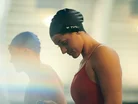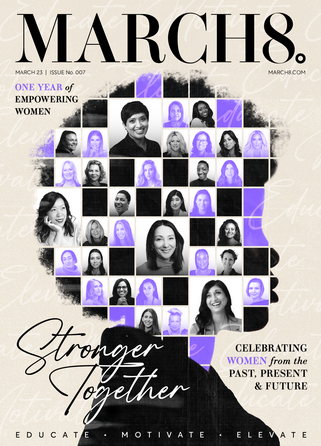Sport in the spotlight: Olympic swimmer, Molly Renshaw

Competing professionally in any sport is mentally and physically taxing – something that British swimmer Molly Renshaw has known since starting her career at just 14 years old. From travelling the world to missing competitions by a fingertip, we sat down with Molly in Derbyshire, UK, to discuss the highs and lows of her phenomenal career in the water.
Where did your love for swimming come from?
My parents wanted me to learn how to swim as a child, just as a life skill so I would be safe on holidays – that kind of thing. I started off having private lessons, but when my instructor said I took to the water well, I was encouraged to join a local swimming club, Ripley Rascals. At age 10, I was scouted by a Derbyshire County Group called Derventio Excel, which is when I started swimming part-time.
It was so fun because I was around a group of people the same age as me, all aspiring to be swimmers one day. But, of course, this is when things started to get a bit more serious, with early mornings and gym sessions. I had a really good year in 2011, where I dropped 10 seconds off my best time, making the European Juniors and the World Senior team. My career escalated very quickly from there.
That summer, I competed in Shanghai, China, on the world stage with the likes of Becky Adlington and Jo Jackson. As a 14 year old, it was quite daunting and unexpected, but it allowed me to have longevity in the sport while growing my confidence.
Now I’m a senior member of the team, I love being able to mentor younger swimmers and look out for them in the same way that others looked out for me when I was that age.
Would you say that you were born a swimmer?
My family would definitely say so! I am quite blessed because swimming did come very naturally to me, so even without hard training, I would be a good swimmer. Having that baseline talent is definitely a blessing, so any hard work is just going to build upon that and make me faster. I guess I’m not that good on land, so maybe I was born to be in the water?
Competing in sport at a professional level comes with its fair share of challenges – what have been the toughest obstacles for you?
Competing in the London 2012 Olympics was the absolute dream for me. I had a really good chance at making the team as I had made the qualifying times, I just had to perform on the day. Back then, we had trials in April and in June. In April, they would only take the top swimmer, and as I was second, I was put on hold until June. I missed the qualifying time by 0.1 second, so I missed the Olympics by a fingertip.
It was a lot to take as a 15-year-old, looking back. It knocked my confidence for a few years, and I was mentally in a hole for two, maybe three years. I was still making teams, but I wasn’t thriving at the same level. I wouldn’t wish that upon any 15 year old, but it’s definitely made me tougher in the long run – I’ve now done three Olympic cycles and am looking forward to my fourth.
Do you think that women are getting more recognition in swimming – have you seen a change over the years?
From 2008 to 2012, I felt like women – such as Becky Adlington, Jo Jackson and Caitlin McClatchey – were dominating the sport. But then Adam Peaty and Duncan Scott came along and shifted it more to the male side. Over the last year or two, though, I feel like the women are starting to creep back, so it’s feeling more equal. I think I am lucky to be in a sport where it’s equal pay and equal opportunities, as I know this isn’t the case for a lot of sports.
As a professional athlete, you obviously get to travel the world with friends that you compete with. How is that?
It’s probably one of the biggest perks of the job. It’s sometimes easy to get down in the dumps about how hard training is, and, by the weekend, all I want to do is spend my time in bed.
But, a lot of the time, I have to pinch myself and realise that this is like my full-time job. And I'm very grateful that we do get to travel to some amazing places and train outside in the sun in places like Australia. So I have to take a step back and be thankful for what I do, the friends I’ve made and the life lessons I've learned. So my motto is a happy swimmer is a fast swimmer, and, although that’s kind of cheesy, I’ve tried to live by the rule for the past 10 years.
Is it right that you were considering retiring after the 2020 Olympic Games?
It was definitely in my head. I thought that, maybe at the age of 24, I was past it – which seems silly now because it’s so young, but as I had been in the sport for so long, I wondered when I was going to stop improving. But after the pandemic I was achieving my best times, achieving personal best and breaking British records, which obviously makes swimming so much more enjoyable.
After that, I had the dream year, although I didn’t perform as well as I wanted in the Olympics. If I had done, I would have been more likely to retire to end my career on a high. But now, I want to give myself the time to correct what went wrong and achieve what I wanted to in the 2020 Olympics, just a few years later in 2024.
Earlier, you mentioned that you’re a senior member of the team. What advice do you give to young swimmers that you wish you knew when you were starting out?
The biggest learning point for me was to enjoy the journey. There have definitely been times when I’ve taken things too seriously. I’ve had to take a step back to realise that yes, it’s a competitive sport, but if I’m not enjoying it, I won’t be performing to my full potential.
Featured Articles
B Corporation certification has long been hailed as the gold standard of sustainability – we explore why
How does a retail investor replicate, as closely as possible, a venture capital investment strategy? Paula Tavangar of SwissBorg Ventures explores
Michelle Li shares how parents can ensure their children are taking the right steps to a more sustainable future




